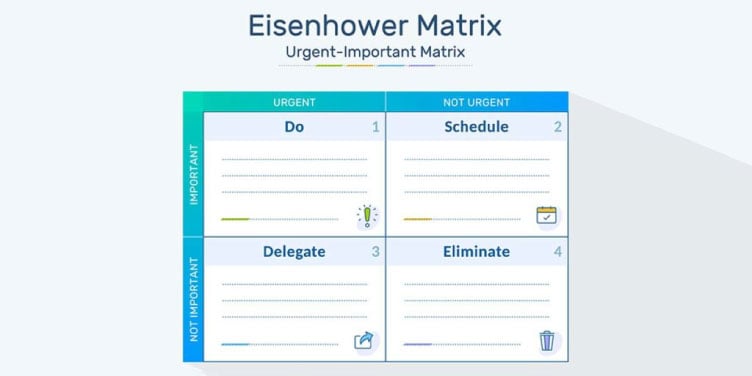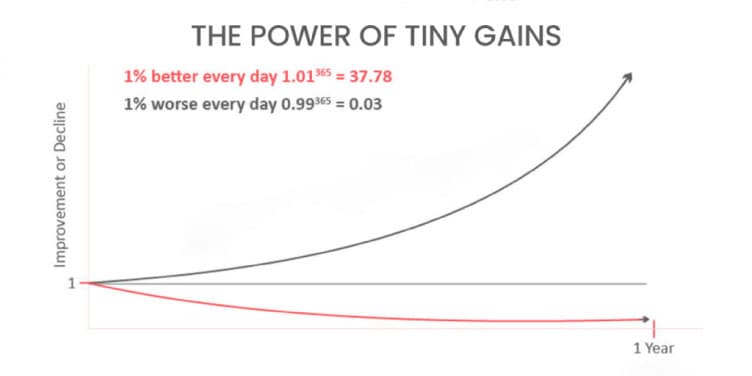Sometimes after a long day’s work, you want to come home and unwind, watch TV, eat a frozen dinner, and do absolutely nothing.
You don’t have to beat yourself up for having a “sweatpants day” every once in a while. The vast majority of successful and productive people also have a lazy day sometimes.
You know you’re in trouble though, when being lazy goes from a “sometimes” situation to an everyday way of life.
If that’s where you are right now, don’t go on a rampage of googling “How to stop being lazy,” and relax. We’re going to unravel a couple of points and show you how you can tackle laziness from multiple different angles.
Often, laziness has a deeper cause that we don’t want to think about, let alone acknowledge.
In this article, you will learn:
- What the major causes of laziness are
- 7 powerful methods that teach you how to stop being lazy and become more productive
Why Am I So Lazy?

The concept of laziness can mean different things to different people.
For some, laziness can manifest itself as a lack of interest or enthusiasm for things they once enjoyed. While for others, it can be expressed as having little to no energy or the motivation to do literally anything.
Therefore, the first step in figuring out how to stop being lazy is to uncover what’s stopping you from getting things done.
There could be a handful of reasons why you may be feeling lazy. Go through the list below and see what you can relate to.
Major causes of laziness:
- Your goals are not big enough.
You could be aiming too low, and your goals simply don’t inspire you to take action.
- Your tasks are fuzzy and not specific enough.
You only have a vague notion of what you want or need to do. This fails to produce a sustainable long-term motivation to take action.
- Procrastination might be getting the better of you.
Things you’ve been putting off are beginning to pile up, and you don’t want to face the discomfort of dealing with them.
- You’re feeling overwhelmed with too much on your plate.
It feels like there are not enough hours in a day to do everything, so why even try?
- You’re self-sabotaging.
You set an ambitious goal, and after a while, you feel the laziness creeping in. This is how you begin taking steps to prevent yourself from reaching your goals.
Even if only one of these motivation killers is present, you could be feeling lazy and uninspired.
If you are ready to do something about it, there are a handful of things you can do, starting today.
7 Powerful Ways on How to Stop Being Lazy

1. Reprogram your mind
Laziness can happen for several reasons. It can stem from a lack of motivation and confidence in your abilities or mental blocks you could be experiencing.
You might be wondering, “Can laziness be cured?”
Simply speaking, “Yes!”
Many of the reasons for your laziness can be treated with self-hypnosis.
Having worked with thousands of people, including Olympic athletes, CEOs, and Hollywood superstars, Marisa Peer has been referred to as a “world-renowned hypnotherapist.”
Marisa is well-known for teaching simple techniques and steps to reprogram the mind. She has helped many let go of unwanted psychological issues or mental blocks, producing radical life-changing results.
During her three decades of experience, Marisa developed a list of rules by which your mind works.
One of these rules states: “Your thoughts influence your feelings, your feelings influence your actions, and your actions define the outcomes of your events. So if you change your thinking, you change everything.”
This means that if you habitually talk to yourself in a negative, pessimistic, or even destructive way, it negatively affects how you see situations and how you react to them.
You can use Marisa’s pre-recorded self-hypnosis audio to work directly with your subconscious. This is the deeper part of your mind that keeps perpetuating these negative, disempowering thoughts without your awareness.
The subconscious mind is powerful; it has the ability to shape your reality, whether you want it or not. It can make you feel lazy and sluggish or motivated and driven—the trick is in taking control over the process.
Marisa’s ‘Stop Procrastination’ self-hypnosis audio will help you reach into the depth of your subconscious and replace the negative thoughts with positive, empowering ones.
Listen to the self-hypnosis at least once per day for 21 days in a quiet and relaxing environment. Very soon you will start noticing positive changes in your everyday behavior.
2. Learn to prioritize
Learning how to prioritize can help declutter the path towards getting anything done.
When you are overwhelmed with countless tasks on your to-do list, it’s hard to know which one to focus on first.
Getting very little done at the end of the day can end up making you feel lazy when in fact, you probably just don’t prioritize well.
The truth is not all tasks are equally important. Knowing which ones to prioritize first can make or break your progress.
This is where the Eisenhower Matrix can come in handy.

Every single task you have on your to-do list will fall into one of the following categories:
- Important and urgent: These are the tasks that can’t wait so you should get them done as soon as possible. Anything with a tight deadline goes here.
- Important and not urgent: These are usually tasks that you can schedule and get to after you’ve dealt with important and urgent.
- Not important and urgent: These types of tasks you can simply give to someone else, or if not possible, get to them after the first two types are completed.
- Not important and not urgent: It’s quite possible that you have certain tasks in your to-do list that don’t really add much value to any aspect of your life. It’s up to you to decide what those tasks are and simply remove them from your to-do list.
Pick the one thing that’s most important and urgent and just get started on it right now.
3. Divide and conquer big tasks
When you’re faced with a big task, it may feel daunting and overwhelming, but as the saying goes: “There is only one way to eat an elephant; a bite at a time.”
If you are wondering how to overcome laziness, learn how to accomplish big tasks with ease.
Here’s the trick:
Set aside some time and divide the big, intimidating task into consecutive smaller, bite-sized tasks.
How to do it?
Big tasks, such as writing a paper, organizing a birthday party, or planning a trip, consist of subtasks that must be completed before you can consider them done.
For example, if you’re writing a blog article, you would want to start with the research, then prepare an outline, break it down into further subsections, and only then actually start writing.
This approach can be applied to literally anything.
Once you start chomping on that big task one bite at a time, the feeling of laziness will be replaced with the feeling of accomplishment.
4. Focus on 1% improvement

Whether it’s writing a book, building a business, or achieving any grand goal, people often put pressure on themselves to create some mind-blowing result, and fast!
Don’t bother with trying to get things right perfectly, as that will most likely be too much pressure and deter you from even starting.
When you’re figuring out how to be less lazy, remember that it is a journey of continuous incremental progress toward your goal.
Like many, you probably also think that “big change = big action.” However, that is not necessarily the case.
The truth is when you are working toward achieving a particular goal, “big change” can equal “small actions” (over time). Small actions—even as tiny as 1% improvement—can reap exponential results.
So the formula is quite simple: if you improve anything by 1% each day for a year, you’ll end up getting nearly 38 times better by the end of that year.
Here is what the math looks like:
1st day: 1 x 1.01 = 1.01
2nd day: 1.01 x 1.01 = 1.020
3rd day: 1.020 x 1.01 = 1.030
The results may look Incrementally insignificant early on, but fast forward 365 days later and It adds up to:
1.01^365 = 37.8

After a year of improving just a little bit every day, you can get almost 38 times better.
If, instead of getting 1% better, you stay lazy and get 1% worse every day, your productivity and motivation will quickly reduce to practically zero.
Let’s assume that you stay on a trend of being lazy for one full year; how would this look for you?
1st day: 1 x 0.99 = 0.99
2nd day: 0.99 x 0.99 = 0.9801
3rd day: 0.9801 x 0.99 = 0.9703
Just like before, it doesn’t look like a big deal early on, but fast forward 365 days later, and that’s:
0.99^365 = 0.03
As you can see, if you can get 1% better every day, that gets you a nearly 38x improvement. At the same time, if you get slightly lazier every day for a year, it erodes your motivation almost completely.
Remember: small changes over time = huge changes later.
If you want any change to stick and transform into a habit, focusing on progress over perfection is key.
5. Improve your diet and exercise
More often than not, you may be feeling lazy, tired, or sluggish simply because you’re not moving enough or feeding your body the nutrition it needs.
Think of your body as a car: when you are driving your car frequently, fuel gets used up, the motor’s moving parts get lubricated and don’t rust, and the battery gets recharged.
However, a car that sits stagnant for too long tends to deteriorate: fuel goes bad, the battery dies, and different parts of the engine begin to erode.
So, putting in high-quality fuel and driving it frequently is imperative for it to function and maintain itself.
Your body is the same.
Eat healthily and avoid processed junk food
Your body uses food as fuel for energy. The wrong type of food will lead to inefficient energy production within your body.
A study conducted on 12 healthy young men found that a few days of eating junk food led to a reduction in their energy levels. This was due to their poor nutrition and how it affected the body’s ability to turn glucose into energy efficiently.
Keep away from highly-processed sugary and fatty foods, and start getting more natural and healthy foods in your day-to-day diet.
An easy guide on keeping a healthy diet is to eat vegetables that have a variety of colors. Make sure to incorporate more wholewheat and grains, and make sure you always hydrate well.
Do any form of exercise
The sedentary lifestyle has its consequences. The longer you stay inactive, the harder it is to mobilize yourself to move. This is because your body is now slowly getting used to a lower expenditure of energy.
Having said that, one of the most important things you can do to raise your energy levels is to exercise.
Even increasing the number of steps you take on a daily basis and limiting the time you spend sitting is a great start.
Additionally, exercise also has positive effects on your mood and mental well-being that signals to your body that it’s time to bring back that drive and energy you thought you lost.
6. Fix your sleep
Even though you might not pay that much attention to having a solid sleep schedule, according to Matthew Walker, the author of the book ‘Why We Sleep’:
“Routinely sleeping less than six or seven hours a night demolishes your immune system, more than doubling your risk of cancer.”
If that alone didn’t wake you up to the importance of sleep, you should know that lack of it directly contributes to the feeling of laziness. Feeling tired negatively affects your productivity, focus, and motivation.
How to do it:
Cut down on caffeine intake.
Research on caffeine and its effects on the human circadian clock found that consumption of caffeine three hours before bedtime induced a ~40-minute delay of melatonin production—a hormone responsible for healthy sleep cycles in humans.
In a nutshell, caffeine makes it harder for your body to rest properly.
A good rule of thumb is to simply have a caffeine cut-off time at around 12 p.m. in order to avoid long sleepless nights.
Avoid screens at least one hour before bedtime.
During our nightly rest, our bodies produce the hormone melatonin to help us sleep. On the other side of things, our bodies also produce the hormone cortisol during the day. It is used to stabilize our immune system, energy levels, and manage stress.
Since cortisol is a stress hormone, you do not want it to find its way into your sleep.
Research has found that excess screen time before bed raises the amount of cortisol in our bodies and decreases melatonin production. This, in turn, results in heightened stress levels and poor sleep quality during your resting hours.
7. Talk To An Expert

Here’s a question for you:
What if you’re too lazy to even begin figuring out how to stop being lazy?
That’s easy—get an expert to do it for you!
Yes, you read that right; there are experts out there that have a proven track record of helping thousands of people overcome laziness successfully.
One such expert is Marisa Peer. She is the author of five best-selling books, a public speaker on the topics of the mind and personal growth, and the UK’s #1 voted therapist.
Marisa Peer’s 30+ years of experience in the field of therapy have been distilled into her revolutionary method called Rapid Transformational Therapy® (RTT®).
Rapid Transformational Therapy® (RTT®) allows you to go straight to the root cause of all of your problems with laziness which lie in your subconscious mind.
Under the supervision of an experienced RTT therapist, you are able to reframe disempowering stories you have been telling yourself for years.
Finally, you will adopt new positive beliefs about who you are and how your life can look.
RTT® combines the most beneficial principles of hypnotherapy, psychotherapy, neuro-linguistic programming, and neuroscience, which is what makes it so uniquely effective.
You can book a call with one of the RTT® specialist therapists trained by Marisa Peer herself. Each of these therapists has a proven record of helping people tackle their issues.
With the help of an RTT® therapist, you can let go of laziness and bring back the drive and motivation you once had, in as little as one to three sessions.


